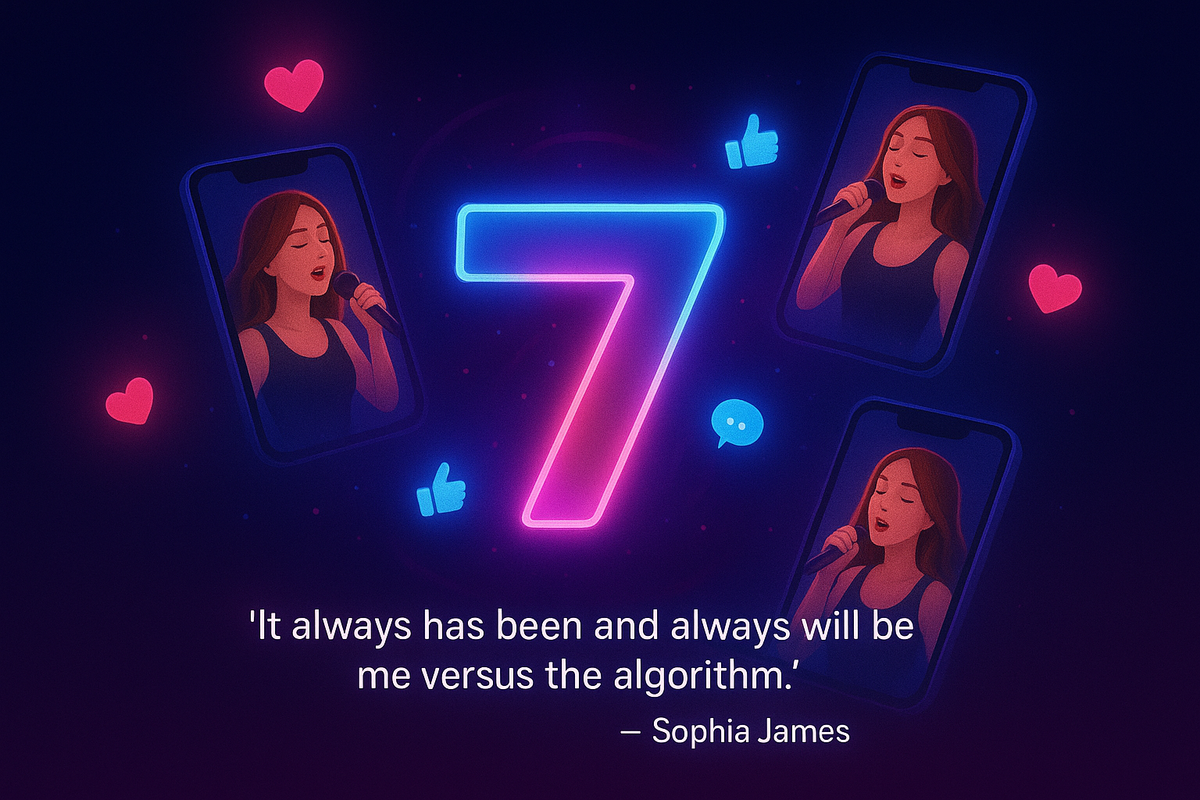
When a "Science Experiment" Becomes a Cultural Movement
In less than a week, an unknown musician turned a simple marketing test into one of 2025's most explosive social media phenomena. The result? Over 52 million views, 100,000 new followers, celebrity endorsements, brand partnerships, and a song rocketing up the charts. This is the Group 7 story—and it's a masterclass in viral marketing that every business should study.
The Anatomy of a Viral Moment
On October 17, 2025, singer Sophia James posted seven consecutive videos on TikTok, each featuring her new single "So Unfair." Her goal was straightforward: test TikTok's algorithm to see which video would gain the most traction. She labelled each video with a group number—Groups 1 through 7—and told viewers which group they belonged to based on which video appeared on their "For You" page.
"It always has been and always will be me versus the algorithm," James declared in one of her videos, "and today, I have decided that I am winning."
What happened next defied all expectations. The seventh video—Group 7—went viral in spectacular fashion, spawning an entire internet subculture seemingly overnight.
The Secret Sauce: Community, Identity, and FOMO
Within days, Group 7 evolved from a simple label into a badge of honour. TikTok users who saw the Group 7 video first began declaring themselves "Group 7 baddies"—self-described as attractive, confident, darkly humorous, artistic, and playful. The community started defining itself, creating characteristics and an identity around an entirely arbitrary designation.
The brilliance? James tapped into three powerful psychological drivers:
Exclusivity and Status: Being in Group 7 wasn't something you could choose—it was algorithmically ordained. This created instant perceived value and status. Users couldn't buy their way in or game the system; they either saw the video first or they didn't.
Tribal Identity: Once people identified as Group 7 members, they found each other. They created content about what made Group 7 special. They playfully mocked Groups 1-6. User-generated content exploded as people riffed on the joke, each adding their own interpretation.
Community-Driven Momentum: James didn't have to sustain the trend alone. Her "Group 7 baddies" took ownership, creating news channels, electing "presidents," debating who deserved to stay in the group, and defending their group's superiority. The content became self-perpetuating.
The Marketing Genius Behind the Chaos
While it appeared organic and chaotic, the strategy was remarkably sophisticated. James later revealed her approach was born from necessity: she'd learned she had to "bully" the TikTok algorithm to succeed.
"You just have to post no matter what it is—it's really quantity over quality," she explained. "In my pursuit to get my music heard, I've really been trying all of these different strategies."
But here's what made it genius: Every single video—across all seven groups—featured her song "So Unfair" as the soundtrack. As millions participated in the Group 7 phenomenon, they were organically promoting her music. The song became Group 7's unofficial "anthem."
One TikTok observer captured it perfectly: "Everyone is using her song, and it is the best marketing technique I have ever seen a musician do. I think we all should really know the name Sophia James."
From Meme to Mainstream: When Brands Join the Party
The speed at which Group 7 crossed from internet joke to commercial opportunity was breathtaking. Within days:
- Pizza Hut launched a 35% discount for "Group 7 members"
- NFL teams including the San Francisco 49ers and Kansas City Chiefs posted Group 7 content
- Celebrities like Barbara Corcoran, Naomi Osaka, and actress Madelyn Cline publicly declared themselves Group 7
- Multiple brands offered TikTok-exclusive giveaways tied to the trend
James herself capitalized on the momentum, organizing real-world meetups in London and Los Angeles, transforming digital community into physical gathering.
The Lessons for Your Business
The Group 7 phenomenon offers invaluable insights for anyone trying to break through the noise of social media:
1. Test, Iterate, and Measure Relentlessly
James didn't guess what would work—she tested seven different approaches simultaneously. Most businesses post once and hope. Winners post strategically and learn from data.
2. Give People Something to Rally Around
The group designation gave people an identity to adopt and defend. What can you create that lets your audience feel like they're part of something special?
3. Let Your Community Co-Create
James provided the spark, but the community built the fire. She didn't control the narrative—she released it into the wild and let it evolve organically. User-generated content multiplied her reach exponentially.
4. Embrace Quantity (Strategically)
James acknowledged the uncomfortable truth about social algorithms: you need volume. But she made her quantity strategic—same core message, same song, different entry points.
5. Manufacture FOMO Without Seeming to Try
The genius was making Group 7 membership seem random and exclusive. People couldn't buy it or manipulate it. This made it more desirable than any paid ad campaign could achieve.
6. Have a Product Worth Promoting
None of this would have mattered if "So Unfair" wasn't a catchy song. The virality brought people in, but the quality made them stay and stream.
7. Move Fast When Lightning Strikes
Within a week, James had organized meetups, gained 100,000 followers, and secured her position as a cultural moment. When something works, scale immediately.
The Algorithm Isn't Your Enemy—It's Your Partner
Perhaps the most important takeaway is James's mindset shift. She stopped seeing the algorithm as an obstacle and started seeing it as a puzzle to solve. She acknowledged its rules (favour quantity, reward engagement, create retention) and worked within them creatively rather than fighting against them.
The Unknown Ending
As of now, Group 7 continues to evolve. News channels document its progress. "Presidents" emerge. The rules change daily. Where it ends, nobody knows—and that's part of the magic.
But one thing is certain: Sophia James proved that even in 2025's saturated social media landscape, creativity, strategy, and a willingness to experiment can still launch an unknown artist into the stratosphere.
The question for businesses isn't whether they can replicate Group 7 exactly—you can't and shouldn't try. The question is: What's your version of this experiment? What arbitrary, playful, community-building concept can you test?
Because somewhere out there, another creator is posting their own "Group 7" right now. Will it be you?
The Group 7 trend demonstrates that in the attention economy, the winners aren't always those with the biggest budgets—they're the ones willing to experiment boldly, measure honestly, and let their communities run wild with an idea. In a world where everyone wants their content to go viral, Sophia James actually figured out how to make it happen.
Contact Elke Porter at:
Westcoast German Media
LinkedIn: Elke Porter or
WhatsApp: +1 604 828 8788.
Public Relations. Communications. Education;
Proud Member of Original Group 7 (some joined in later), as an expert "baddie".
TAGS:
- #Viral Marketing
- #TikTok Strategy
- #Group 7 Trend
- #Social Media Marketing
- #Algorithm Hacking
- #Content Strategy
- #WBN Ai
- #Elke Porter


